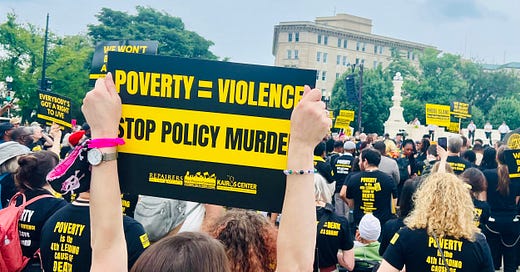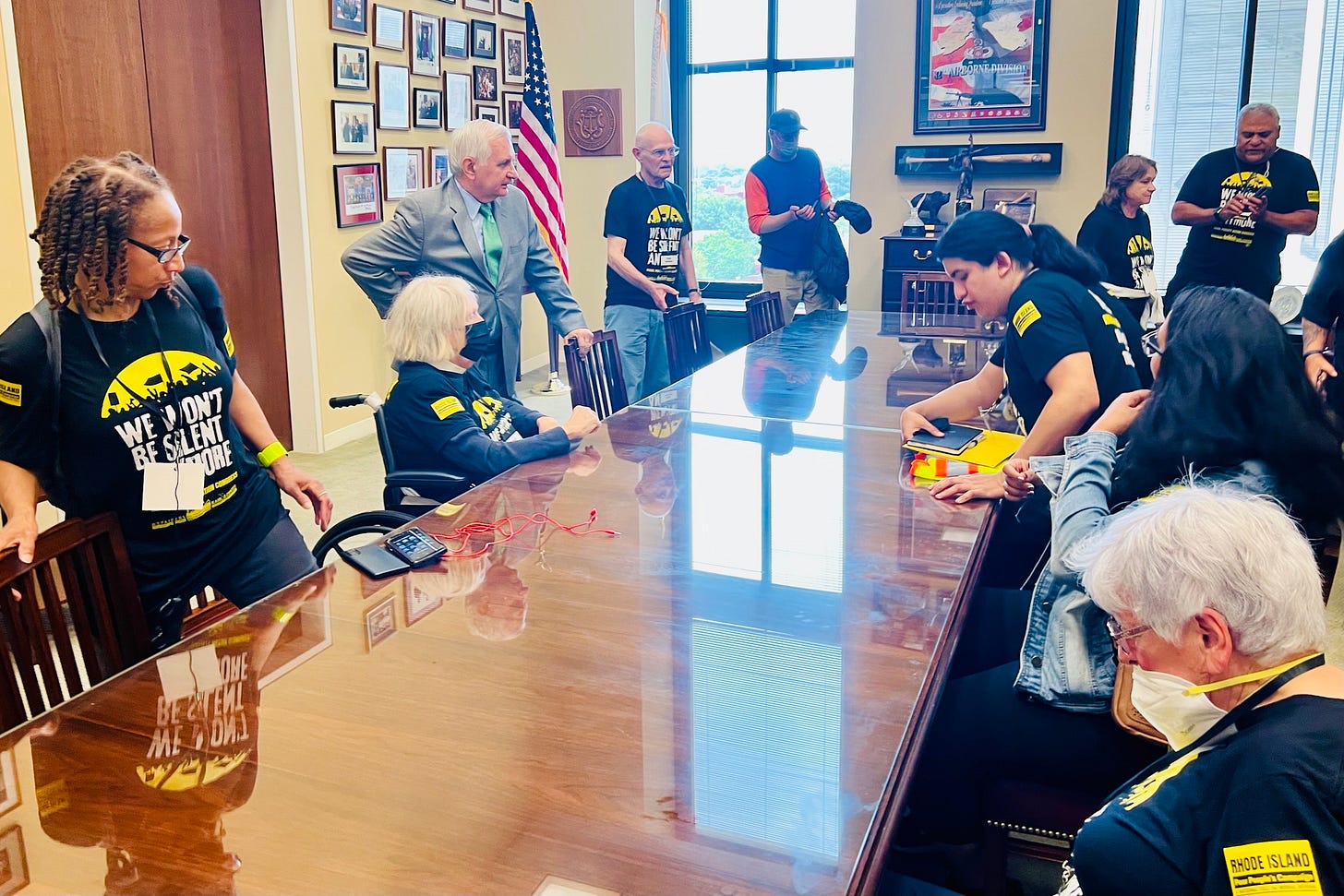Poverty is the fourth leading cause of death in America says the Poor People's Campaign
The RI Poor People's Campaign seeks to highlight poverty as an American death sentence, and demand action to end murder by public policy...
Between 2018-2020, there were 337,000 poor and low-income people, accounting for over 30% of the Rhode Island population, according to a newly updated fact sheet prepared by Poor People's Campaign: A National Call for a Moral Revival Institute for Policy Studies in collaboration with the Institute for Policy Studies.
From the Fact Sheet:
Poverty is a policy choice, reflecting both low wages and high costs of living. These two conditions make it hard to meet basic needs and easy to fall into debt. In Rhode Island:
To meet their basic needs, a household with two adults and two children needs to earn over $25/hour. However, the current minimum wage is just $12.25/hour. At this wage, an individual must work 79 hours/week to afford a modest two-bedroom apartment.
There are 149,802 people, or 27.1% of the workforce, earning less than $15/hour. This includes 127,162 adults and 20.2% of Asian and Native workers, 43.8% of Black workers, 46.4% of Hispanic workers, 22.3% of white workers, 34.3% of working women, and 54.1% of working women of color.
Average household debt rose 7% in 2022 to an average of $58,580.
The average student loan debt held by households was $5,550 at the end of 2022.
Pandemic relief policies temporarily lifted the load of poverty, but ended too soon, resulting in higher rates of economic, food, and housing insecurity. In Rhode Island:
In 2021, 185,000 children in 118,000 households received the expanded Child Tax Credit, and 48,000 low-wage workers without children received the expanded Earned Income Tax Credit. The expansions contributed to a dramatic decline in poverty but ended in 2021.
In 2022, 139,400 people relied on expanded SNAP (food stamps) benefits to feed themselves and their families. However, in 2023, SNAP benefits were reduced by $90-$250 / month, cutting them down to $6 / day. At least 81,077 households will be impacted by these cuts.
At the beginning of 2023, more than one year after eviction protections were ended, 42,040 households reported being behind on their rent or housing payments.
Across the country, approximately 1,000 people are still dying from Covid every week and millions of people lack access to health care. In Rhode Island:
During the most intense period of the pandemic, 45,100 people were uninsured.
With the ending of continuous eligibility for Medicaid, 68,400 people are estimated to lose access to health care. Between 2019 and 2020, Rhode Island experienced a 1.3-year decline in average life expectancy.
Extreme heat, storms, and drought are becoming more common, with poor and low-income communities at greatest risk. In Rhode Island:
Over the past century, the state warmed by 2.2 degrees Celsius, which is 1.1 degrees more than the global average. As this trend continues, food production, the spread of diseases, and health will all be adversely impacted.
Precipitation patterns have also changed, with increased risks of flooding, drought, and water scarcity.
The percentage of poor and low-income household income that goes towards energy costs is 5 times greater than what an average income household spends on energy.
Government spending that prioritizes war, mass incarceration, excessive policing, and anti-immigrant forces is leading to greater violence, fear, and criminalization of the poor. In Rhode Island:
In 2023, taxpayers will contribute $291.73 million to Pentagon spending, $82.96 million to immigration enforcement, and $99.99 million to nuclear weapons.
Over the past 30 years, $2 million in military equipment (tanks, drones, combat rifles, and ammunition) has been transferred from the Pentagon to state and local law enforcement.
Between 2001-2020, 308 veterans committed suicide.
In 2021, 64 people were killed by gun violence.
There are 1,287 people incarcerated. As of April 2023, 60 immigrants are in detention. From Oct 2002-June 2022, over 194 people were deported from Rhode Island.
Across the nation, a surge of attacks on voting rights and on the rights of women and LGBTQ+ people are denying basic rights to millions of people and constraining our ability to participate in democracy. Poor and low-income people can change this direction. In Rhode Island:
There were 15 voter-restrictive bills introduced between 2020 and 2023 and five anti-LGBTQ+ laws introduced in 2023. None of these were enacted.
In Rhode Island, there are 241,306 poor and low-income eligible voters, including 186,289 white voters, 35,227 Latino voters, 1,517 Asian voters, 7,106 Black voters, and 65 Indigenous voters. Together, they account for 25.05% of the electorate.
Last Monday Rhode Island Poor People’s Campaign leaders were among hundreds of poor and impacted people, advocates, and faith leaders from across the country who attended the three-day Moral Poverty Action Congress in Washington D.C. to shift the nation’s attention to the reality of poverty in the country, highlight poverty as an American death sentence, and demand action to end murder by public policy.
The Congress sounded the alarm on the crisis of poverty and sought to push confronting poverty onto the nation’s agenda heading into the 2024 elections. The three days were spent strategizing a new season of intensification around the moral fusion movement to end poverty across the nation, which will include coordinated mobilizations in state capitals as well as a massive voter engagement operation heading into the 2024 election.
“The real moral question for our country is where we stand in relation to the poor and the least of these - who are many of us,” wrote the Reverends William Barber and Liz Theoharis in an op-ed published Tuesday in Religion News Service. “Instead of deflecting to culture wars and partisanship, lawmakers ought to focus on the hundreds of people dying each day from poverty in the wealthiest nation on earth. Our politicians have failed to act, and leaders who stand silent in the face of these injustices are complicit in their deaths.”
William J. Barber II is the president and senior lecturer at Repairers of the Breach and co-chair of the Poor People's Campaign: A National Call for a Moral Revival. Elizabeth Armen 'Liz' Theoharis is an American theologian who is the co-chair of the Poor People's Campaign: A National Call for a Moral Revival.
WHAT IT MEANS TO BE AMERICA IS AT STAKE
The Congress opened Monday with a launch event hosted by the Yale Center for Public Policy and Public Theology featuring the Reverend Barber leading a discussion with Yale School of Public Health Assistant Professor Gregg Gonsalves; UC-Riverside Professor David Brady, author of a recent report citing poverty as the fourth leading cause of death in America; and Valerie Wilson from the Economic Policy Institute.
“We need to realize that those who have power make choices that create poverty,” said Gonsalves, assistant professor at the Yale School of Public Health. “They don’t get it wrong by mistake.”
The launch event, which was broadcast live on C-Span, began with a moment of silence for those lost to poverty, and a series of videos of members of the Poor People’s Campaign who passed away as a result of poverty.
“What does it say about the greatest country on earth, the land of the greatest opportunities, if we know what we need to do to address the problem, but only do it periodically for limited amounts of time?” asked Wilson. “The entire idea of what it means to be America is at stake.”
The Moral Poverty Action Congress comes as 68,400 Rhode Islanders are estimated to lose access to health care with the end of the Covid-era Medicare expansion.
DEMANDING A THIRD RECONSTRUCTION
Following Monday’s Congress launch, hundreds of Poor People’s Campaign leaders from over 30 states, including Rhode Island, visited the offices of Senators Jack Reed and Sheldon Whitehouse, and Congressman Seth Magaziner, and more than 400 Senate and House offices on both sides of the aisle to demand lawmakers use their power to address poverty, which kills more people every year than homicide but gets significantly less of the attention from politicians.
Impacted people, advocates, and faith leaders then held a national speak-out in front of the United States Supreme Court, where participants raised the alarm about the death sentence of poverty in America – the fourth leading cause of death in the country – and honored loved ones lost to poverty.
At the speakout, poor people, advocates, and faith leaders held signs that read, “Everybody’s Got a Right to Live,” “Lift from the Bottom, Everybody Rises,” and “There are 140 Million Poor and Low Wealth People in the U.S.” They wore t-shirts emblazoned with the words “Poverty is the 4th Leading Cause of Death – Higher than Homicide,” and “Poverty = Death, America’s Shame,” and they chanted “Poverty equals Death, Fight Poverty, Not the Poor.”
“Most people don't realize they are just one hospital visit away from losing their homes,” said Warwick Rhode Island resident Catherine Ibern. “The insurance companies have such a hold over our healthcare, the testing that we need, the cost of medications, and whether or not the medications our doctors prescribe are covered. I had a stroke this past November while my husband was between jobs and was prescribed a blood thinner. With Medicare, the pharmacy wanted over $800 because, on Medicare, discounts are not available. With clots in both of my legs and a hole in my heart, this medication is necessary to keep me from further complications of a stroke. We need our leaders in Congress to stand up against these practices that are causing harm to us every day. Medicare needs ‘some fine tuning’ to provide the care it's supposed to.”
Rally-goers discussed how they have been personally impacted by the interlocking injustices of poverty, racism, ecological devastation, an unjust criminal justice system, and more as millions of people in the United States remain trapped in a cycle of poverty because the wealth and resources of our country have been flowing to a small number of people and federal programs are not meeting the growing needs of the poor.
Following the speakout, participants walked to the Capitol, where they joined Representatives Pramila Jayapal (Democrat, Washington) and Barbara Lee (Democrat, California) who announced plans to reintroduce a Third Reconstruction Resolution – a sweeping package of 20+ policies to tackle poverty and address other systemic injustices.
Diamond Madsen, of Pawtucket, Rhode Island, is once again threatened with homelessness. She had a near-meltdown during the walk. Reverend Barber noticed and asked her to lead the walk, which restored her balance. “Providence Housing almost has me homeless again after eight years because of their paperwork and lack of staff communication,” said Madsen. “Now, my landlord is on my back again. My mental health is on the line.”
BUILDING A PATHWAY TO END POVERTY
On the final day of the Congress, Reverend Barber led a Moral Movement delegation of poor and impacted people, advocates, and faith leaders, including delegates from the Rhode Island Poor People’s Campaign on a visit to the White House to demand the Administration of President Joe Biden address the death by poverty that is devastating our nation. The delegation also included co-chairs of the Poor People's Campaign the Reverend Liz Theoharis and Service Employees International Union International President Mary Kay Henry.
This year’s Congress builds off The Mass Poor People’s and Low Wage Workers’ Assembly and Moral March on Washington and to the Polls last June, in which thousands of poor and low-wealth people marched and rallied ahead of a massive voter mobilization drive for the midterm elections
.









